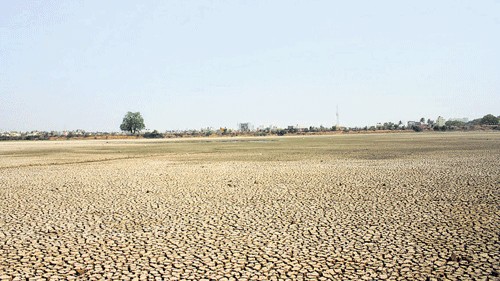
Representative image of dry land.
Credit: DH File Photo
The southwest monsoon has slowed down in the last few weeks, causing concern in many parts of the country, including Karnataka. While July had a surplus of rains, August has seen an extended lean period. The country has seen 7 per cent less rainfall cumulatively this monsoon compared to the long-period average (LPA) because of a 31 per cent deficit this month. This August may turn out to be the driest in the last 100 years. There are also indications that it may get worse in the coming days. It is southern, eastern and central India that have suffered the most deficit. The sowing of kharif crops has been hit in many areas. There are reports that sowing of pulses has come down by 10 per cent. The prices of pulses rose by 13 per cent in July and so the deficient monsoon does not augur well for food prices and the inflation levels in the coming weeks.
The kharif crops were sown in many areas in July when there was ample rainfall. The lack of follow-up rains may hit the crops which need water now. The paucity of rains is bound to affect the rabi crops, too. The failure of rains now will reduce the moisture in the soil. This will pose a problem in the coming rabi season and major crops like wheat, onions and potatoes are likely to be hit. Irrigation is an important part of rabi farming. The poor run of the monsoon now will bring down the reservoir levels, affecting irrigation. According to the Central Water Commission, water levels in 146 major reservoirs are 78.6 per cent of last year’s and 93.9 per cent of the 10-year average levels for this time. The impact of El Nino may have started to be felt, and so there is the need to start preparations to meet the situation. It is likely that the food price levels may remain elevated and may impact the general inflation rate in the coming weeks. The central government may have to make major supply-side interventions to keep the prices in check. The present situation also underlines the need to improve irrigation facilities in the country.
Karnataka has started evaluating the difficult situation in many districts. Some districts and taluks may have to be declared as drought-hit. Payment of compensation and other forms of relief for farmers will have to be considered. Farmers who have lost their crops may consider planting other short-duration crops. In a drought situation, even drinking water may be a problem, and facilities for that also may have to be provided. The government will have to be ready for all these eventualities and to handle the situation.